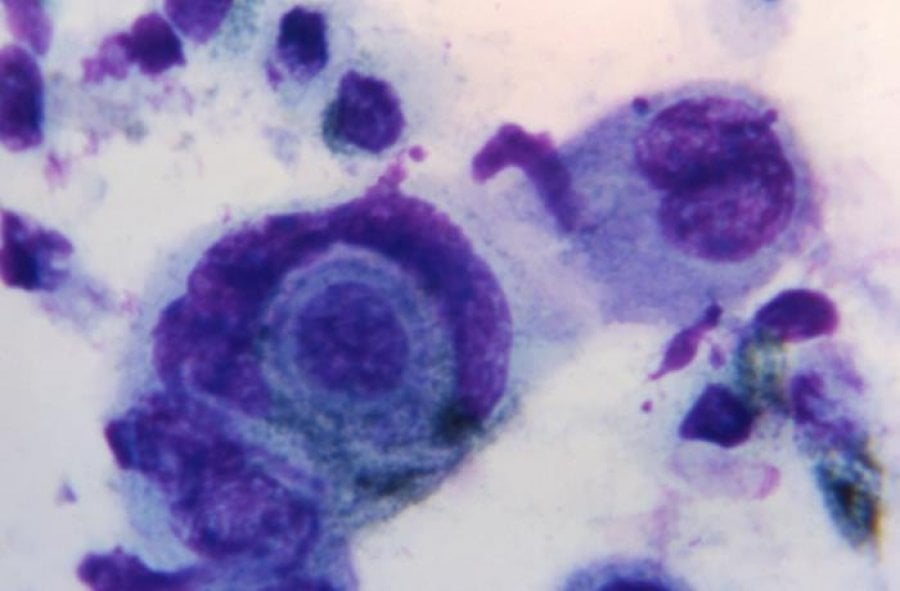Adult exposure to chickenpox linked to lower risk of shingles, but does not provide full protection
23 January 2020 London School of Hygiene & Tropical Medicine London School of Hygiene & Tropical Medicine https://lshtm.ac.uk/themes/custom/lshtm/images/lshtm-logo-black.png
Photomicrograph of a skin scraping sample from chickenpox (varicella) patient. Credit: CDC Public Health Image Library/Dorothy Reese
The results support the theory that re-exposure to the herpes zoster virus in adulthood (after chickenpox infection as a child), boosts immunity to shingles. However, this boosting does not provide complete protection.
In light of these findings, the research team – led by the London School of Hygiene & Tropical Medicine – suggest the modelling work underpinning the UK’s childhood varicella vaccination policy, which assumes complete immunity for between two and 20 years, may need updating.
Primary infection with the varicella zoster virus causes chickenpox in children, typically. The virus then remains in the body as a dormant infection, which can reactivate decades in adulthood to cause shingles.
Currently, the UK’s childhood varicella vaccination policy is based on the assumption that ‘exogenous boosting’ – where re-exposure to the virus in adulthood (typically via children in the home) boosts immunity – provides complete protection against shingles for between two and 20 years.
Therefore, the UK and many other countries don’t offer routine childhood varicella vaccination as this would remove circulating virus in the community.
This study found that there is some protection against shingles from exposure to the virus in later life, however it does not provide complete protection.
In the 10 to 20 years after exposure, this protective effect waned slightly but adults were still 27% less likely to develop zoster compared to non-exposure.
Lead author Dr Harriet Forbes from the London School of Hygiene & Tropical Medicine said:
“This study cannot be used to justify for or against any specific chickenpox vaccination schedules. However, it strongly suggests that cost effectiveness modelling studies for routine chickenpox vaccination may need revisiting. The models currently assume adults gain complete immunity to shingles for between 2 and 20 years after exposure to a person with chickenpox, whereas this study suggests adults gain only partial immunity.”
Dr Forbes is a UKRI Innovation Fellow at LSHTM, who is currently working on her PhD looking at risk factors for zoster and postherpetic neuralgia, using UK electronic healthcare records.
Publication
Harriet Forbes, Ian Douglas, Adam Finn, Judith Breuer, Krishnan Bhaskaran, Liam Smeeth, Simon Packer, Sinéad M Langan, Kathryn E Mansfield, Robin Marlow, Heather Whitaker, Charlotte Warren-Gash. Risk of herpes zoster after exposure to varicella to explore the exogenous boosting hypothesis: self controlled case series study using UK electronic healthcare data. British Medical Journal. DOI: 10.1136/bmj.l6987
If you enjoyed this article and would like to build a career in global health, we offer a range of MSc programmes covering health and data, infectious and tropical diseases, population health, and public health and policy.
Available on campus or online, including flexible study that works around your work and home life, be part of a global community at the UK's no.1 public health university.